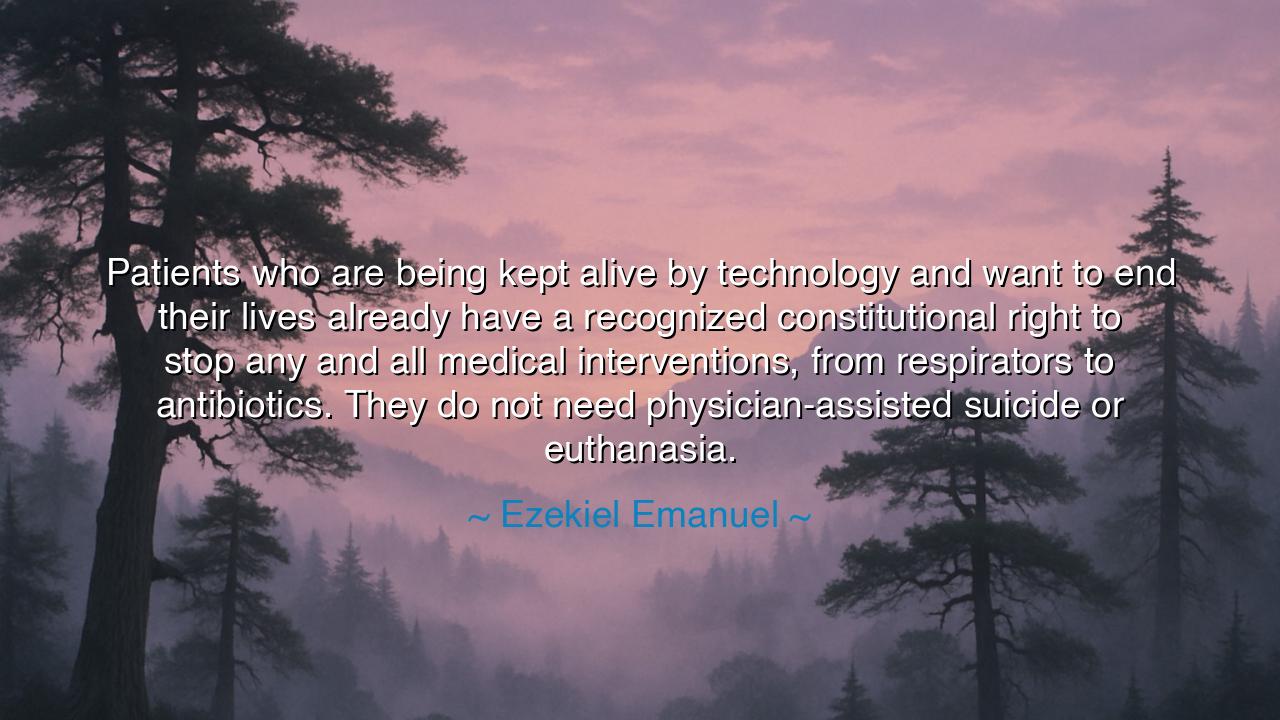
Patients who are being kept alive by technology and want to end
Patients who are being kept alive by technology and want to end their lives already have a recognized constitutional right to stop any and all medical interventions, from respirators to antibiotics. They do not need physician-assisted suicide or euthanasia.






Hear, O seekers of mercy and wisdom, the words of Ezekiel Emanuel, who declared: “Patients who are being kept alive by technology and want to end their lives already have a recognized constitutional right to stop any and all medical interventions, from respirators to antibiotics. They do not need physician-assisted suicide or euthanasia.” In this reflection, the physician-philosopher speaks not of politics or legality alone, but of the sacred boundary between life, death, and human choice. His words echo through the halls of both medicine and morality, reminding us that the power to die with dignity is already bound within the right to refuse the instruments of prolongation.
Emanuel’s insight arises from his deep experience in medical ethics, where questions of life’s sanctity meet the compassion of release. He reminds us that technology, though born of mercy, can also become a chain. The respirator, the feeding tube, the steady drip of intravenous medicine—these miracles of modern science can sustain the body even when the spirit longs for rest. Yet Emanuel insists that freedom is not denied to the one who suffers. The law, and more profoundly, the human conscience, already grants the right to withdraw the machinery of preservation. Death, when accepted rather than inflicted, remains part of the natural order—the quiet return to stillness after a storm.
To understand the meaning of these words, we must look to the story of Karen Ann Quinlan, a young woman who, in 1975, fell into an irreversible coma. Her parents sought to remove the respirator that kept her body alive, believing that her soul had already departed. Their struggle, carried through the courts, became a landmark moment in the history of medical ethics. The ruling in their favor established the precedent that a patient—or their guardians—may refuse extraordinary medical treatment. This became the cornerstone of the modern “right to die” doctrine, upon which Emanuel’s quote stands. It was not about hastening death, but about restoring dignity and peace when medicine had done all it could.
Emanuel’s wisdom challenges a deeper misunderstanding in our age—the belief that compassion requires control, that love must manifest through intervention. He reminds us that there is a sacred difference between letting go and taking life. The former is an act of humility, an acknowledgment that every flame, no matter how bright, must one day fade. The latter, though often born of mercy, risks severing the natural thread of existence before its destined end. In his vision, the physician’s role is not to command life or death, but to walk beside the patient—to relieve pain, to offer truth, and, when the time comes, to remove the burdens that bind the body unnaturally to the earth.
From a broader view, this philosophy reflects an ancient reverence for the balance between human power and divine mystery. The Greeks spoke of hubris—the arrogance of exceeding mortal limits—and taught that wisdom lies in knowing when to act and when to yield. The healer who clings to technology without purpose becomes enslaved to his own tools. The family who demands endless intervention forgets that life is not measured by its length, but by its grace. Emanuel’s words, therefore, call us back to equilibrium—to recognize that mercy sometimes lies not in extension, but in acceptance.
The lesson is profound: dignity does not depend on duration. To choose the moment of rest is not weakness but wisdom. Yet Emanuel also warns that we must tread carefully—that the call for assisted death must not eclipse the existing right to refuse unnatural prolongation. His teaching is a shield against both cruelty and overreach—a reminder that compassion must walk hand in hand with restraint, and that freedom must never be twisted into destruction.
Practical wisdom flows from this truth. When confronted with the suffering of the dying, let us act not from fear or haste, but from love informed by understanding. Let physicians offer honesty without despair, and families offer courage without guilt. Let technology serve life, not enslave it. And let death, when it comes, be met with dignity, peace, and respect for the ancient rhythm of existence.
O seeker of compassion, remember this: Ezekiel Emanuel teaches that the right to die is already the right to live freely—to live without coercion, to live without artificial chains, and to die without shame. To honor this truth is to walk the narrow path between mercy and mastery, where wisdom whispers: life’s worth lies not in its extension, but in its meaning, love, and acceptance.






AAdministratorAdministrator
Welcome, honored guests. Please leave a comment, we will respond soon